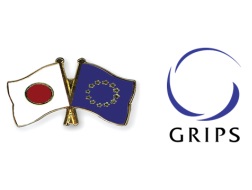
| Speaker | 13:00-18:00, Saturday, October 5th, 2013 |
|---|---|
| Time | Grand Prince Hotel Kyoto, (Takaragaike, Sakyo-ku, Kyoto-shi, Kyoto 606-8505, Japan) (Access) |
| Venue | National Graduate Institute for Policy Studies (GRIPS), The EU Delegation to Japan together with the EU Member States |
| Sponsor | Japanese and English (Simultaneous translation avilable) |
| Language | Free (Preregistration required) |
Despite economic difficulties, the levels of research and development spending are growing and great efforts are undertaken to modernise and restructure the national innovation systems. All this is done in order to keep up in the immensely growing international competition.
In this fierce competition those nations are more successful that are able to breed their national excellence while at the same time they participate in international networks. Sharing and collaborating with competitors/partners has become key. Nations want their researchers to become international, but they do not want to lose them. How does this work?
International collaboration brings the direct confrontation of different schools of thought, the integration and the exposure to different cultures and markets. From an industrial point of view, is collaboration not too sensitive? When preparing for a new generation of technology international standardisation will be a crucial goal of joint research. Technologies need to be accepted in various countries. How to navigate between competition and cooperation?
As the international collaboration becomes more important, efforts are on the way to create a Global Research Council. Today, the EU's "Horizon2020" is the most open collaboration programme. Are national science organisations ready to take the challenge? What are the demands of industry - how do they link up for a next generation of their products?
- Mauro Dell' AMBROGIO State Secretary for Education and Research of Switzerland
-
Maria ORLOWSKA Deputy Minister of Science and Higher Education of Poland
-
Carmen VELA State Secretary for Research, Development and Innovation of Spain
-
Yuko HARAYAMA Executive Member, Council for Science and Technology Policy, Japan
-
Malcolm HARBOUR EU Parliament's Vice President of STOA (Tech Assessment)
-
Michiharu NAKAMURA President, Japan Science and Technology Agency (JST), Japan
For latest informatin, please visit EU Delegation's webpage.
Contacts:
Barbara RHODE - 03-5422-6050 Tom KUCZYNSKI - 03-5422-6058